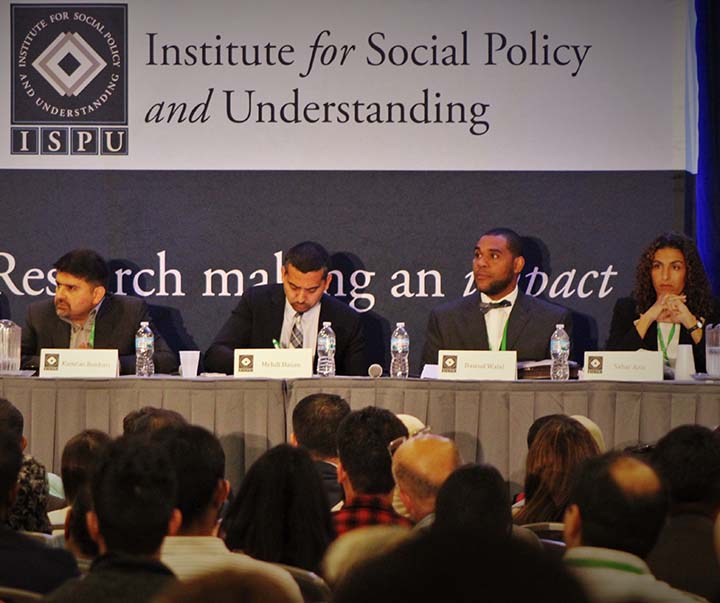Engagement with Law Enforcement, Harm or Benefit?
CVE (Countering Violent Extremism) is a government program that seeks to stamp out violent extremism by providing resources to targeted communities to build and sustain on-the-ground prevention efforts. Since its initiation, CVE has become a topic of contention among politicians, critics and scholars. Is CVE effective, or does it unfairly place responsibility upon specific groups (often American Muslims) to prematurely detect terrorist activity? Contrasting viewpoints leave American Muslim communities wondering whether or not they should engage with law enforcement on CVE measures.
On this page, ISPU compiled resources about Countering Violent Extremism efforts and how they impact the Muslim community, showcasing multiple perspectives. This collection includes resources that range from a guide by CLEAR on what to do when approached by law enforcement on community outreach and engagement, to a PBS NewsHour segment.

DISCLAIMER: ISPU does not endorse any of the positions presented on this page; rather, this collection is meant to help inform the public and present them with varying sides of existing arguments.
The Debate
Because the issue of CVE engagement is both complex and relevant, affecting American Muslims across the country, ISPU hosted a debate at the September 2016 ISNA convention in Chicago: Debating CVE: Engagement with Law Enforcement, Harm or Benefit? The debate, moderated by Mehdi Hasan from Al Jazeera, featured Sahar Aziz, Dawud Walid, Muqtedar Khan and Kamran Bokhari. These scholars discussed the relative harm or benefit of engaging with the U.S. government on CVE. This session provided a platform for thought leaders to present arguments from both sides of the issue, in the process informing members of the American Muslim community to make knowledgeable decisions regarding their engagement with CVE. To be clear, the debate focused on engaging with law enforcement on voluntary programs and not on reporting criminal activity to the authorities should it become known, which was not in question.
Harm

Sahar Aziz

Dawud Walid
Benefit

Kamran Bokhari

Muqtedar Khan
Post-Debate Coverage + Announcements
 |
Alejandro J. Beutel with Asma Shah and Mimi Yu in Al-Madina Institute | November 29, 2016 |
Advancing the Conversation on CVE |
 |
Alejandro J. Beutel with Mimi Yu & Asma Shah in Patheos | November 1, 2016 |
What is CVE (Countering Violent Extremism)? |
 |
Sahar F. Aziz in The New Arab | September 26, 2016 |
Testifying before Homeland Security: Identify the enemy |
 |
Mohamed Ghilan in Al-Madina Institute | September 13, 2016 |
CVE, Afghanistan, and the Theological Castration of Muslims |
 |
Dawud Walid in Al-Madina Institute | September 7, 2016 |
The Danger of Imams Being Involved in CVE |
 |
Ron Nixon in The New York Times | September 4, 2016 |
Muslim Gathering Laments a ‘Normalization of Bigotry’ |
On September 9, 2016, ADC, CAIR, and a number of other organizations issued a statement indicating the organizations won’t be applying for the DHS CVE grants.
ADC issued guidelines for organizations applying for CVE grants. Although the organization does not encourage CVE engagement, it wants folks who are applying to be knowledgeable.
CVE Engagement Resources
Featured Thought Leaders
OP-Eds, Commentaries, & Blogs
Overview Resources
Videos
Imam Mohamed Magid, the executive religious director of ADAMS Center in Sterling, Virginia, explains how he’s prevented people from joining ISIS.
Professor Muqtedar Khan explains Countering Violent Extremism (CVE).

